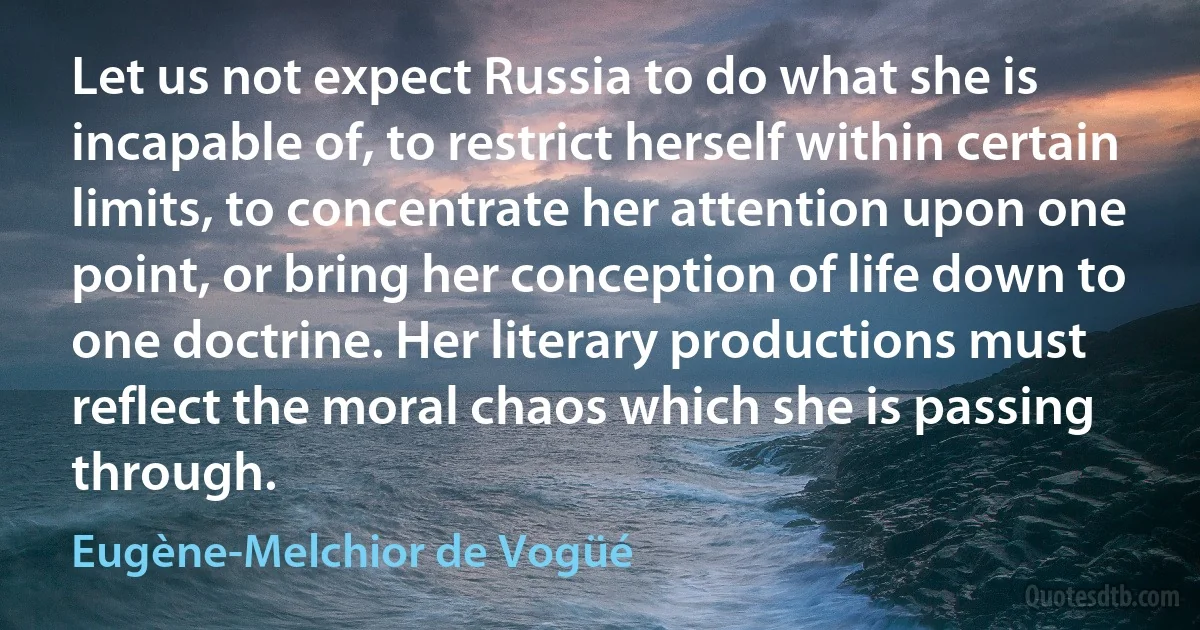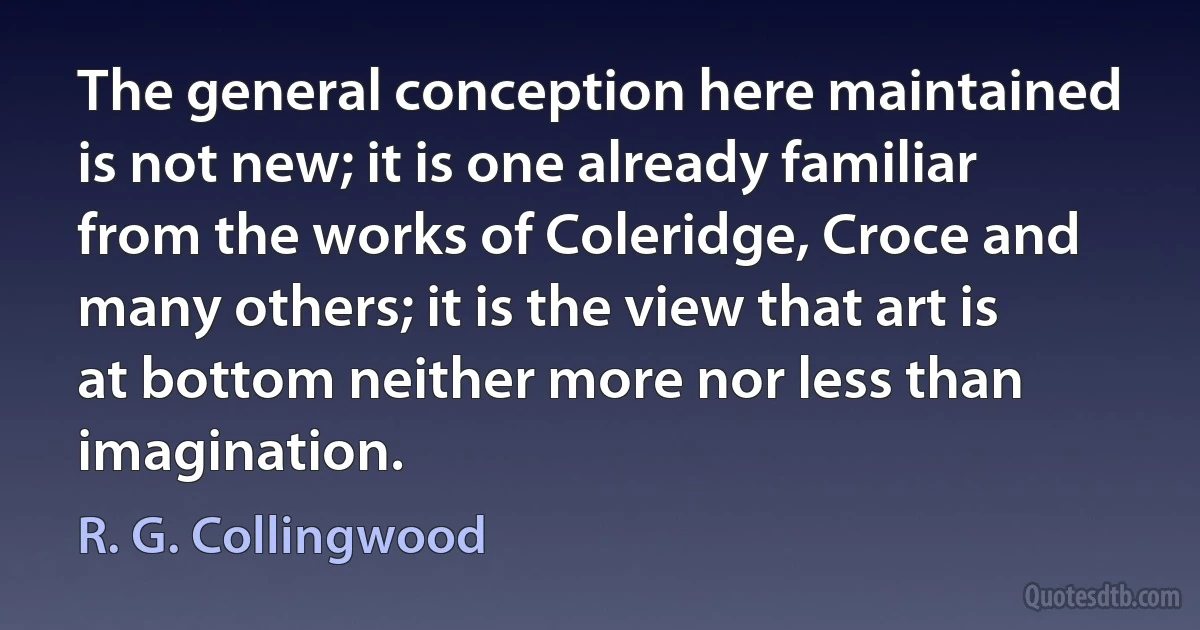Conception Quotes - page 15
There were two modern ideas of the State which, they believed, had the same tendency to set up a despotic administrative system. One was the deification of the State and the absolute subordination of the individual to it. That was the solution of Fascism and, as they added later, of National Socialism. The other was the State of the common weal, or, as would be said today, the State of social services. It was the modern form of the ‘philanthropic' State, in which the individual was controlled for his good by the State, down to the smallest details of life. The Bolshevist State, they considered, lay in the line of this conception.

Hermann Rauschning
By Mammonism is to be understood: on the one hand, the overwhelming international money-powers, the supragovernmental financial power enthroned above any right of self-determination of peoples, international big capital, the purely Gold International; on the other hand, a mindset that has taken hold of the broadest circle of peoples; the insatiable lust for gain, the purely worldly-oriented conception of life that has already led to a frightening decline of all moral concepts and can only lead to more.

Gottfried Feder
The first notion of constructing a free goal-seeking mechanism goes back a wartime talk with the psychologist, Kenneth Craik, whose untimely death was one of the greatest losses Cambridge has suffered in years. When he was engaged on a warjob for the Government, he came to get the help of an automatic analyzer with some very complicated curves he had obtained, curves relating to the aiming errors of air gunners. Goal-seeking missiles were literally much in the air in those days; so, in our minds, were scanning mechanisms. Long before the home study was turned into a workshop, the two ideas, goal-seeking and scanning, had combined as the essential mechanical conception of a working model that would behave like a very simple animal.

William Grey Walter
Gentlemen: Fascism is a party, a political doctrine. But Fascism, while being a party, a political doctrine is above all a total conception of life. So the fascist, whether his is writing in newspapers or reading them, going about his private life or talking to others, looking to the future or remembering the past and the past of his people, must always remember he is a Fascist. Thus he fulfills what can really be said to be the main characteristic of Fascism, to take life seriously. Life is toil, is effort, is sacrifice, is hard work.

Giovanni Gentile
On the whole, I have annoyances to bear, of which you can hardly form a conception. One of them is the mutual jealousy of almost all the French officers, particularly against those of higher rank than the rest. These people think of nothing but their incessant intrigues and backbitings. They hate each other like the bitterest enemies, and endeavor to injure each other wherever an opportunity offers. I have given up their society, and very seldom see them. La Fayette is the sole exception; I always meet him with the same cordiality and the same pleasure. He is an excellent young man, and we are good friends... La Fayette is much liked, he is on the best of terms with Washington.

Johann de Kalb
The bourgeois ... conception of freedom really arose as a special case of a group of illusions about domination which has been associated with all forms of society based on dominating classes. This group of illusions has for a common factor the belief that domination secures self-determination.

Christopher Caudwell
It is necessary to distinguish between socialism and socialism-in fact, between idea and idea of the same socialist conception, in order to distinguish among them those that are inimical to Fascism. It is well known that Sorellian syndicalism, out of which the thought and the political method of Fascism emerged-conceived itself the genuine interpretation of Marxist communism. The dynamic conception of history, in which force as violence functions as an essential, is of unquestioned Marxist origin. Those notions flowed into other currents of contemporary thought, that have themselves, via alternative routes, arrived at a vindication of the form of State-implacable, but absolutely rational-that finds historic necessity in the very spiritual dynamism through which it realizes itself.

Giovanni Gentile
One of Collingwood's earliest attempts to define the aesthetic essence of art. His aim, he writes in the preface, is to state a general conception of art and develop its consequences. His conception is one already familiar through the writings of others -- "that art is as bottom neither more nor less than imagination" -- but from his observation he goes on to outline the various distinctions between subordinate conceptions of art, and to attempt to demonstrate their place in the general conception, and the place of both in life. He urges that the meaningfulness of art cannot be torn from the imaginative setting in which it is embedded, and that we must attempt to explain the process by which an artist reaches a particular point of view on reality.

R. G. Collingwood
The slave-owner is at times visited with a nightmare. He finds that his free will, in spite of its freedom, is thwarted, not by a superior will but by things-in-themselves – by inferior wills, accidents, mistakes, and his own ignorance. Yet he is still unable to conceive his will except as being thwarted like that of his slave's by another will, and since he the master is so thwarted, might not even the world's master and his – God Himself – be thwarted in his volition by some grand over-riding will, by Will-in-Itself? This is the slaveowning conception of Moira, or Fate, a comparatively late development reaching its noblest expression in Greek tragedy. This Fate, in spite of its closeness to bourgeois determinism, betrays its slave-owning parentage by the fact that it is always visualised as a consciously forseeing Will, and always as thwarting, not determining human wills as well as events, but interfering with human wills by means of events.

Christopher Caudwell
Grosseteste appears to have been the first medieval writer to recognize and deal with the two fundamental methodological problems of induction and experimental verification and falsification which arose when the Greek conception of geometrical demonstration was applied to the world of experience. He appears to have been the first to set out a systematic and coherent theory of experimental investigation and rational explanation by which the Greek geometrical method was turned into modern experimental science. As far as is known, he and his successors were the first to use and exemplify such a theory in the details of original research into concrete problems.

Alistair Cameron Crombie
If for the entire universe we conceive the same magnitude to be determined, consistently and with due regard to all circumstances, which for a single body I have called entropy, and if at the same time we introduce the other and simpler conception of energy, we may express in the following manner the fundamental laws of the universe which correspond to the two fundamental theorems of the mechanical theory of heat.
1. The energy of the universe is constant.
2. The entropy of the universe tends to a maximum.

Rudolf Clausius
I have pursued this intellectual program by building a radical alternative in social theory to Marxism, by recasting legal thought as an instrument of the institutional imagination, by proposing particular institutional alternatives for the organization of the economy and the state, and by developing a philosophical conception of nature and mankind within which history is open, novelty is possible, and the divinization of humanity counts for more than the humanization of society.

Roberto Mangabeira Unger
From the time when Guldberg and Waage gave quantitative form to the speculations of the physicist Berthollet, a clear conception of chemical equilibrium, in sharp contrast to an anthropomorphic theory of affinity dating back to Hippocrates and Barchausen, has yielded rich and abundant fruit.

J. R. Partington
The way in which the irrational numbers are usually introduced is based directly upon the conception of extensive magnitudes-which itself is nowhere carefully defined-and explains number as the result of measuring such a magnitude by another of the same kind. Instead of this I demand that arithmetic shall be developed out of itself.

Richard Dedekind
The Nazi appealed to the socialist traditions of German labor, declaring the worker ‘a pillar of the community,' and the ‘bourgeois'-along with the traditional aristocracy-a doomed class. Hitler, who told associates that he was a ‘socialist,' had the party adopt the red flag and, on coming to power, declared May 1 a national holiday; Nazi Party members were ordered to address one another as ‘comrades (Genossen). His conception of the part was, like Lenin's, that of a militant organization a Kampfbund, or ‘Combat League.

Richard Pipes



